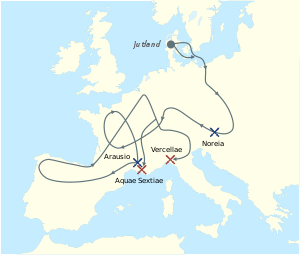Battle of Arausio
| Battle of Arausio | |||||||
|---|---|---|---|---|---|---|---|
| Part of the Cimbrian War | |||||||
 The migrations of the Cimbri and the Teutons. |
|||||||
|
|||||||
| Belligerents | |||||||
|
Cimbri Teutones |
|
||||||
| Commanders and leaders | |||||||
|
King Boiorix King Teutobod |
Quintus Servilius Caepio Gnaeus Mallius Maximus |
||||||
| Strength | |||||||
| About 200,000 | 80,000 troops (10-12 legions), up to 40,000 auxiliaries and camp followers |
||||||
| Casualties and losses | |||||||
| 15,000 killed | 80,000 killed or up to 120,000 killed if support troops and camp followers included | ||||||
The Battle of Arausio took place on 6 October 105 BC, at a site between the town of Arausio (modern day Orange, Vaucluse) and the Rhône River. Ranged against the migratory tribes of the Cimbri under Boiorix and the Teutoni were two Roman armies, commanded by the proconsul Quintus Servilius Caepio and consul Gnaeus Mallius Maximus. However, bitter differences between the commanders prevented the Roman armies from cooperating, with devastating results. The terrible defeat gave Gaius Marius the opportunity to come to the fore and radically reform the organization and recruitment of Roman legions. Roman losses are described as being up to 80,000 troops, as well as another 40,000 auxiliary troops (allies) and servants and camp followers — virtually all of their participants in the battle. In numbers of losses, this battle is regarded as the worst defeat in the history of ancient Rome.
The migrations of the Cimbri tribe through Gaul and adjacent territories had disturbed the balance of power and incited or provoked other tribes, such as the Helvetii, into conflict with the Romans. An ambush of Roman troops and the temporary rebellion of the town of Tolosa caused Roman troops to mobilize in the area, with three strong forces.
...
Wikipedia
